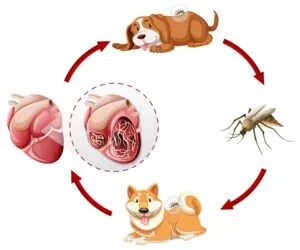10 Common Symptoms of Heartworms in Dogs
Heartworm disease is a serious condition that can affect dogs of all breeds and ages. It is caused by a parasitic worm called Dirofilaria immitis, which is transmitted to dogs through the bites of infected mosquitoes. The worms live in the dog’s heart and lungs, causing damage to these organs and potentially leading to severe health problems and even death. Early detection and treatment of heartworm disease are crucial, so it’s important for dog owners to be aware of the signs and symptoms of the disease. In this article, we’ll discuss ten common symptoms of heartworms in dogs.
1. Coughing
Coughing is one of the most common symptoms of heartworm disease in dogs. The dog may develop a chronic cough as the worms spread throughout the dog’s heart and lungs and grow larger and larger. The cough could be dry or produce mucus, and it might be worse or more frequent when the dog is exercising or engaging in other activities that raise its heart rate.
2. Fatigue
Heartworm disease can cause dogs to become easily fatigued and have reduced stamina. This is due to the fact that when heartworms are present, the heart has to work harder to circulate blood throughout the body. Heartworm-infected dogs may get tired more easily while out for walks or engaging in other activities that they used to appreciate. They might also have trouble breathing or appear exhausted after little activity.
3. Difficulty Breathing
It may be challenging for dogs to breathe if they have heartworm disease because it can harm their lungs and other organs. As the condition worsens, canines may experience breathing difficulties or shortness of breath, particularly when exercising or engaging in other physically demanding activities. Additionally, they might breathe quickly or laboriously, wheeze, or spit up blood.
4. Reduced Appetite and Weight Loss
Dogs infected with heartworms may lose their appetite or eat less than usual. If left unchecked, this can result in weight loss and malnutrition. The worms can cause inflammation and damage to the dog’s digestive system, making it uncomfortable or painful to eat. They might also be using more energy to fight the infection, which would result in a loss of muscle mass and overall weight.
5. Lethargy and Depression
Heartworm-infected dogs may become less energetic and show less interest in playing or going on walks. They might appear less content or involved and be less responsive to their owners. This is because the dog may feel weak or lethargic as the body expends energy fighting the infection. In extreme circumstances, dogs may even experience depression or display symptoms of cognitive dysfunction.
6. Swollen Belly
In severe cases of heartworm disease, dogs may develop a swollen or distended belly. This is because the presence of heartworms can result in fluid accumulation in the belly by obstructing blood flow in the arteries that supply the liver and other organs. The dog may appear to have a rounded or bloated stomach, and it may also be uncomfortable or in pain.
7. Vomiting and Diarrhea
Dogs with heartworm disease may experience digestive upset, including vomiting and diarrhea. The immune system’s response to the infection or the presence of parasites in the digestive tract may be the reason for this. Dogs may also struggle to properly digest food or absorb nutrients, which can result in malnutrition and weight loss.
8. Seizures and Fainting
Dogs with severe heartworm illness may have seizures or faint fits. This is because the worms are damaging the dog’s heart and other systems, which prevents the brain from receiving enough oxygen. After having a seizure or fainting, dogs may fall unexpectedly or appear confused or disoriented.
9. Nosebleeds
The blood vessels in the dog’s lungs and other organs may be damaged by heartworm illness, resulting in nosebleeds. Frequent or prolonged nosebleeds in dogs with heartworms may signal an advanced stage of the illness. Blood could come from one or both nostrils and may be dark or bright red in color.
10. Abnormal Heart Sounds
A veterinarian can often detect heartworm disease during a physical exam by listening to the dog’s heart with a stethoscope. Heartworm-infected dogs may exhibit an irregular heartbeat or make other noises, like a heart murmur. This is due to the fact that the worms are harming the heart and interfering with its normal functioning.

Diagnosis
The veterinarian has a range of options for heart worm diagnosis. Antigen testing is the technique of choice because it is thought to be the most accurate for finding heart worms. Due to the fact that a heart worm protein can be found in a dog’s blood system after approximately 5 months, it takes almost 6 to 7 months for it to mature. In addition to this, we can also:
- Direct smear method.
- X-Ray
- Ultrasound
Prevention
Prevention is the best way to protect your dog from heartworm disease. The American Heartworm Society recommends that all dogs receive a monthly heartworm prevention medication, which can be prescribed by your veterinarian. These medications are effective at killing heartworm larvae before they can grow into adult worms and cause disease. Additionally, it’s also important to practice mosquito control around your home and to keep your dog indoors during peak mosquito hours, which are typically at dawn and dusk.
Testing for Heartworm Disease
Dogs should be tested for heartworm disease at least once a year, even if they are on preventative medication. This is due to the fact that no preventative measure is 100% successful, and dogs may acquire heartworm disease even when taking regular medication. Early detection and treatment of heartworm disease can help prevent serious health problems and ensure the best possible outcome for your dog.
Conclusion
Heartworm disease is a significant health concern for dogs that, if untreated, can result in serious health issues and even death. It is essential for pet owners to recognize the symptoms of heartworm disease to guarantee quick veterinary care and treatment. Regular testing, mosquito control, and monthly heartworm prevention medications can all help prevent heartworm disease and safeguard the health of your dog. If you suspect that your dog may be infected with heartworms, contact your veterinarian immediately for an evaluation and treatment plan.
If your dog is showing symptoms of Heartworm, Brown Veterinary Hospital in Terre Haute, IN is here to help! Reach out at 812-645-0715 or make an appointment today.
Recent Posts
About Brown Veterinary Hospital
We are here to serve as your partner in keeping your four-legged family member healthy, ensuring you have all the tools you need to provide them with a lifetime of outstanding care. Our animal hospital in Terre Haute offers a full range of services to nurture and extend your pet’s life, from wellness and preventative care to critical care, exotic pet care, and dermatology.





